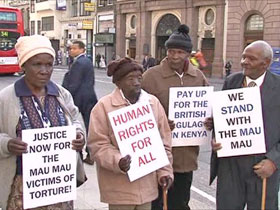Four elderly Kenyans have been given permission to take legal action over alleged British colonial atrocities committed during the Mau Mau uprising.
The High Court ruled they could sue over alleged torture by the British authorities in the 1950s and 1960s.
Mr Justice McCombe said the claimants had an "arguable case" but it would be for a full trial to decide.
It comes as Foreign Office documents released in May showed that the alleged abuse was "sort of a guilty secret".
The documents give further details of what ministers in London knew about how the colony was attempting to crush the rebellion that paved the way to independence.
 |
Left to right: The four claimants: Jane Muthoni Mara, Paulo Muoka Nzili, Ndiku Mutua and Wambugu Wa Nyingi now have permission to sue the British Foreign Office for their alleged torture by British colonial authorities 50 years ago. Photo: BBC |
They contain reports of British officers implicated in atrocities, including the murder of suspected Mau Mau rebels.
'Arguable cases'
The test case claimants, Ndiku Mutwiwa Mutua, Paulo Muoka Nzili, Wambugu Wa Nyingi and Jane Muthoni Mara, who are in their 70s and 80s, say the documents form a paper trail proving that London knew about and approved torture and abuse in Kenya.
They say they were systematically abused and tortured in special camps that had been set up to crush the Mau Mau rebellion against British rule, and want compensation from the government.
At an earlier hearing the judge was told that Mr Mutua and Mr Nzili had been castrated, Mr Nyingi was beaten unconscious in an incident in which 11 men were clubbed to death, and Mrs Mara had been subjected to appalling sexual abuse.
The Kenyans' solicitor Martyn Day said: "They want some sort of justice, an apology, some sort of money that would give them peace in their final years.
"They are not out to make themselves rich, they simply want a deal which allows them to get proper justice."
The Foreign and Commonwealth Office (FCO) argued that it could not be liable because it happened outside of the UK and that Kenya had its own legal colonial government, which was responsible for the camps.
But the judge rejected the strike-out application saying: "I decided the claimants have arguable cases fit for trial... I emphasise that I have not found that there was systematic torture in the Kenyan camps, nor that, if there was, the UK government is liable to these detainees for what happened.
"I simply decided that these claimants have arguable cases in law on the facts as presently known."
BBC
 The Standard Group Plc is a multi-media organization with investments in media
platforms spanning newspaper print operations, television, radio broadcasting,
digital and online services. The Standard Group is recognized as a leading
multi-media house in Kenya with a key influence in matters of national and
international interest.
The Standard Group Plc is a multi-media organization with investments in media
platforms spanning newspaper print operations, television, radio broadcasting,
digital and online services. The Standard Group is recognized as a leading
multi-media house in Kenya with a key influence in matters of national and
international interest.
 The Standard Group Plc is a multi-media organization with investments in media
platforms spanning newspaper print operations, television, radio broadcasting,
digital and online services. The Standard Group is recognized as a leading
multi-media house in Kenya with a key influence in matters of national and
international interest.
The Standard Group Plc is a multi-media organization with investments in media
platforms spanning newspaper print operations, television, radio broadcasting,
digital and online services. The Standard Group is recognized as a leading
multi-media house in Kenya with a key influence in matters of national and
international interest.










